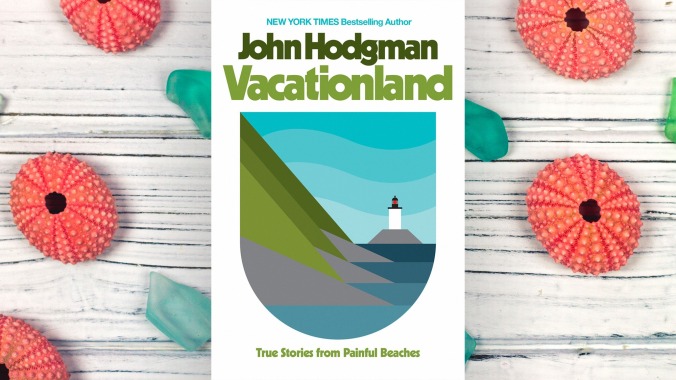John Hodgman gets honest in the warm, melancholy Vacationland

After writing three very funny books of fake trivia, esoteric lists, and other myriad and delightful bullshit, John Hodgman—the multi-hyphenate podcast host, author, former Apple pitchman, Daily Show correspondent, internet storyteller, etc.—has taken a sharp hard turn into truth. His latest book, Vacationland: True Stories From Painful Beaches, tackles such varied, very real topics as the secret perils of municipal garbage delivery and the strange social gauntlet of boat ownership, describing them with the same lyrical, digression-filled warmth he once applied to presidential dream thieves and planet-cracking Century Toads. The subject matter is vastly different—give or take a story here or there about internet troubadour Jonathan Coulton being devoured by witches—but the mind producing it is unmistakably the same, albeit in a more weathered, grounded, and sometimes sadder form.
Structurally, Vacationland divides itself into long meditations on two vacation homes: the one originally owned by Hodgman’s parents in Western Massachusetts, and one purchased later in life in his wife’s native Maine. The book’s two halves correspond to the character of the territories they contain: the first is warmer and more chaotic, centering on memories of its author’s younger life, while the second is more desolate, even as Hodgman is careful to keep a home fire burning against the onset of the coming cold. In both, a current of naked honesty prevails; the writer obscures the names of many of his friends, neighbors, and family members, but lays his numerous anxieties (“Is today the day the men at the garbage dump realize I have been lying to them about living in this township for years?” “What future minefields of fear am I planting for my kids?”) bare for readers to relate to.
If there’s a grand thesis being built toward, Hodgman is wise enough to keep it obscured. Vacationland is divided into bite-sized anecdotes (adapted from Hodgman’s stand-up/storytelling tour of the same name), unified by a tone that’s simultaneously melancholy and amused. When it achieves profundity, it does so by avoiding profundities; in many ways, this is a book about death, but it rarely tackles the subject head-on, instead sketching in the details of the beautiful, silly, time-wasting minutiae and pleasures we all use to run out our personal clocks.








































